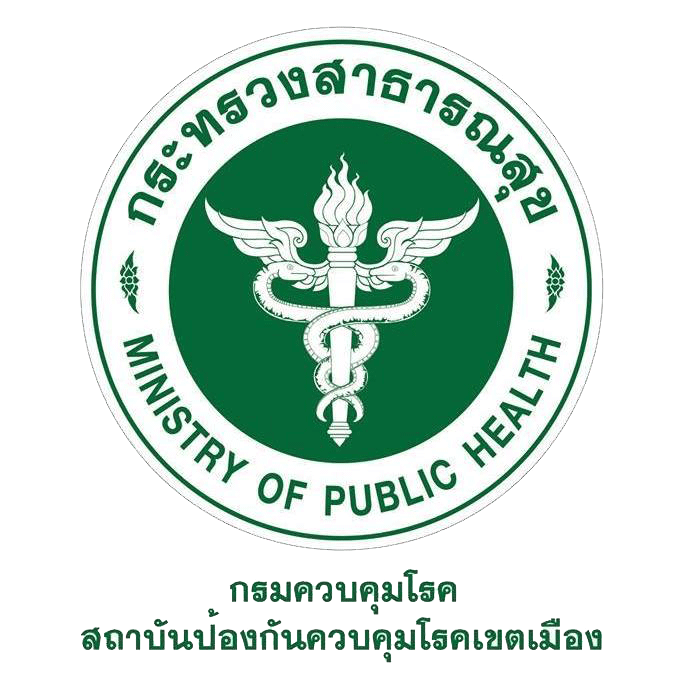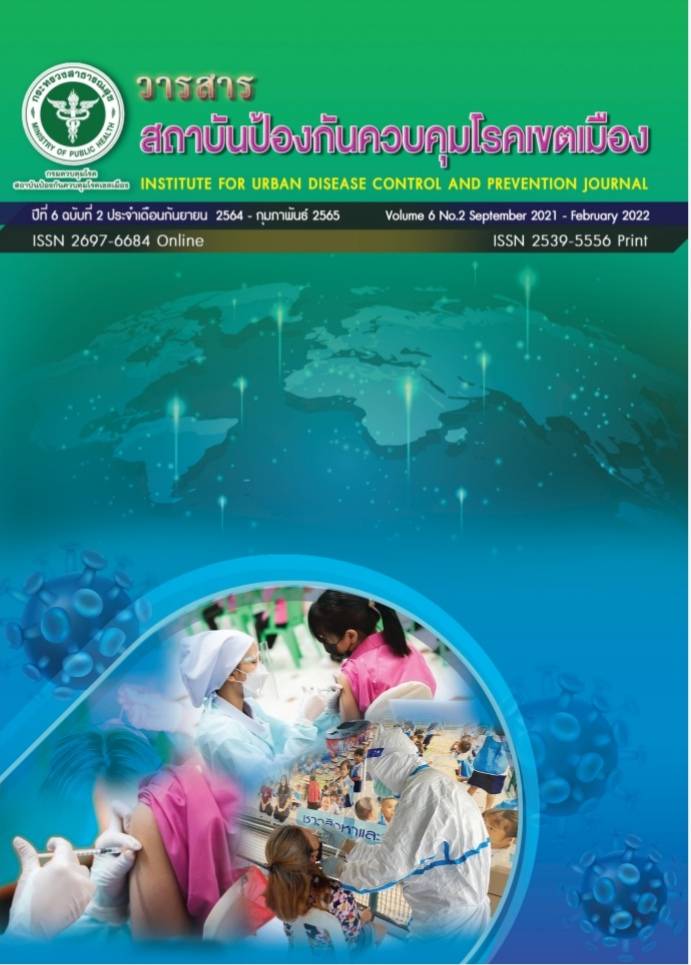ความสัมพันธ์ระหว่างความรู้ ทัศนคติและพฤติกรรมการป้องกันโรคติดเชื้อไวรัสโคโรนา 2019 (COVID -19) ของประชาชนที่อาศัยในชุมชนเมือง
Main Article Content
บทคัดย่อ
โรคติดเชื้อไวรัสโคโรนา 2019 (โรคโควิด 19) เป็นโรคติดต่อระบบทางเดินหายใจ เกิดจากเชื้อไวรัส Severe acute respiratory syndrome coronavirus 2 (SARS-CoV-2) ประเทศไทยค่อนข้างประสบ ความสำเร็จในการยับยั้งการแพร่ระบาดตลอดปี พ.ศ. 2563 ซึ่งมีการระบาดจำนวน 3 ระลอก การศึกษาภาคตัดขวางนี้ มีวัตถุประสงค์เพื่อศึกษาระดับของความรู้ ทัศนคติ และพฤติกรรมการป้องกันตนเองจากโรคโควิด 19 และ ความสัมพันธ์ระหว่าง ความรู้ และทัศนคติเกี่ยวกับการติดเชื้อโรคโควิด 19 กับพฤติกรรมในการป้องกันตนเองจากโควิด 19 ของประชาชนที่อาศัยในชุมชนเมือง เขตบางเขน กรุงเทพมหานคร จำนวน 396 คน เก็บข้อมูลโดยใช้แบบสอบถามความรู้ ทัศนคติ และพฤติกรรมการป้องกันตนเองจากการติดเชื้อโรคโควิด 19 วิเคราะห์ข้อมูลโดยใช้สถิติเชิงพรรณนาและสหสัมพันธ์เพียร์สัน ผลการศึกษาพบว่า กลุ่มตัวอย่างส่วนใหญ่มีความรู้เกี่ยวกับโรคโควิด 19 ระดับสูงร้อยละ 50 มีระดับทัศนคติเกี่ยวกับโรคโควิด 19 ระดับสูงร้อยละ 60.86 และมีระดับพฤติกรรมการปฏิบัติตัวเกี่ยวกับโรคโควิด 19 ระดับกลาง ร้อยละ 64.65 จากการวิเคราะห์หาความสัมพันธ์ระหว่าง ความรู้ และทัศนคติเกี่ยวกับโรคโควิด 19 กับพฤติกรรมในการป้องกันตนเองจากโรคโควิด 19 พบว่า ทัศนคติมีความสัมพันธ์ทางบวกกับพฤติกรรมการป้องกันตนเองจากโรคโควิด 19 p value = 0.010* , r = . 0.129 ซึ่งระดับความรู้ และระดับทัศคติอยู่ในระดับสูงแต่ยังคงมีความวิตกกังวลเกี่ยวกับโรค ดังนั้นการสื่อสารประชาสัมพันธ์ต้องสร้างความตะหนัก ไม่ใช่สร้างความตระหนก และการสื่อสารประชาสัมพันธ์ต้องมีความสอดคล้อง ไม่ขัดแย้ง น่าเชื่อถือเพื่อไม่ให้เกิดความสับสน และต้องมีมาตรการรองรับ หรือมีการให้บริการหลังจากเผยแพร่ประชาสัมพันธ์ ในส่วนระดับพฤติกรรมการปฏิบัติตัวเกี่ยวกับโรคโควิด 19 ในระดับกลาง จึงควรจัดสิ่งแวดล้อมให้เอื้อต่อการเกิดพฤติกรรม ก็จะสามารถส่งเสริมให้เกิดพฤติกรรมที่ดีอย่างต่อเนื่องและยั่งยืนได้
Article Details

อนุญาตภายใต้เงื่อนไข Creative Commons Attribution-NonCommercial-NoDerivatives 4.0 International License.
บทความที่พิมพ์ในวารสารสถาบันป้องกันควบคุมโรคเขตเมือง ถือว่าเป็นผลงานวิชาการ งานวิจัยและวิเคราะห์ ตลอดจนเป็นความเห็นส่วนตัวของผู้เขียนเอง ไม่ใช่ความเห็นของสถาบันป้องกันควบคุมโรคเขตเมือง หรือคณะบรรณาธิการแต่ประการใด ผู้เขียนจำต้องรับผิดชอบต่อบทความของตน
เอกสารอ้างอิง
กรมควบคุมโรค กระทรวงสาธารณสุข. รายงานสถานการณ์โรคติดเชื้อไวรัสโคโรนา 2019. [อินเทอร์เน็ต]. 2564 .[เข้าถึงเมื่อ30สิงหาคม 2564].เข้าถึงได้จาก https://ddc.moph.go.th/viralpneumonia/situation.php
Thailand Development Research Institute (TDRI). การแพร่ระบาดระลอก 3 สถานการณ์ผลกระทบและทางออกเชิงนโยบาย. [อินเทอร์เน็ต]. 2564. [เข้าถึงเมื่อ 10 พฤษภาคม 2564]. เข้าถึงได้จาก https://tdri.or.th/2021/05/covid-119/
กรมควบคุมโรค กระทรวงสาธารณสุข. คู่มือเจ้าหน้าที่สาธารณสุขในการตอบโต้ภาวะฉุกเฉินกรณีการระบาดโรคโควิด19 ในประเทศไทย. [อินเทอร์เน็ต]. 2563. [เข้าถึงเมื่อ 30 เมษายน 2564]. เข้าถึงได้จากhttps://ddc.moph.go.th/viralpneumonia/file/g_other/g_other05.pdf
กรมควบคุมโรค กระทรวงสาธารณสุข. สถานการณ์โรคติดเชื้อไวรัสโคโรนา 2019 (COVID-19) มาตรการสาธารณสุข และปัญหาอุปสรรคการป้องกันควบคุมโรคในผู้เดินทาง. [อินเทอร์เน็ต]. 2564. [เข้าถึงเมื่อ 30 สิงหาคม 2564]. เข้าถึงได้จาก https://ddc.moph.go.th/uploads/files/2017420210820025238.pdf
กรุงเทพมหานคร. ประกาศกรุงเทพมหานคร เรื่องสั่งปิดสถานที่เป็นการชั่วคราว (ฉบับที่ 26) [อินเทอร์เน็ต]. 2563. [เข้าถึงเมื่อ วันที่ 30 เมษายน 2564].เข้าถึงได้จาก https://www.prbangkok.com/th/news/detail/19/4478.
กรุงเทพมหานคร. จำนวนผู้ติดเชื้อแต่ละเขตในพื้นที่กรุงเทพมหานครประจำวันที่ 29 เมษายน
[อินเทอร์เน็ต]. 2564 . [เข้าถึงเมื่อ วันที่ 30 เมษายน 2564].เข้าถึงได้จาก https://www.
prachachat.net/general/news-658472
ประกาศตลาดยิ่งเจริญ. ประกาศตลาดยิ่งเจริญเรื่องเลื่อนเปิดการให้บริการประจำวันที่ 20 พฤษภาคม 2564. [อินเทอร์เน็ต]. 2564 .[เข้าถึงเมื่อ วันที่ 30 พฤษภาคม 2564].เข้าถึงได้จาก https://www.thansettakij.com/general-news/481181
กองนโยบายและแผนงาน สำนักการวางผังและพัฒนาเมือง กรุงเทพมหานคร (2561). สถิติข้อมูลชุมชนในเขตกรุงเทพมหานคร พ.ศ. 2561. [ อินเทอร์เน็ต]. 2564. [เข้าถึงเมื่อ วันที่ 30 พฤษภาคม 2564].เข้าถึงได้จากhttps://webportal.bangkok.go.th/upload/user/00000354/plan/report/07.pdf
ราชกิจจานุเบกษา.ระเบียบกรุงเทพมหานคร ว่าด้วยชุมชนและกรรมการชุมชนที่ตั้งชุมชน พ.ศ. 2564. [อินเทอร์เน็ต]. 2564. [เข้าถึงเมื่อ วันที่ 30 มิถุนายน 2564].เข้าถึงได้จาก: http://www.oic.go.th/FILEWEB/CABINFOCENTER9/DRAWER041/GENERAL/
DATA0008/00008668.PDF
Dong, E., Du, H., & Gardner, L. (2020). An interactive web-based dashboard to track COVID-19 in real time. The Lancet Infectious Diseases, 20(5), 533-534. doi:10.1016/S1473-3099(20)30120-1.
องค์อร ประจันเขต . ความรู้ทัศนคติ และการปฏิบัติตนในการปอ้งกันและควบคุมโรคไข้เลือดออกของนักเรียนโรงเรียนเขาเพิ่มนารีผลวิทยา อ.บ้านนา จ.นครนายก. เวชสารแพทย์ทหารบก 2555; 65 :159-165
กรมอนามัย .วิธีป้องกันการติดเชื้อแบบครอบจักรวาล (Universal prevention) ที่ประชาชนทำได้น้อยที่สุด. [อินเทอร์เน็ต]. 2563. [เข้าถึงเมื่อ30 กันยายน 2564].เข้าถึงได้จาก https://multimedia.anamai.moph.go.th/news/030964/
ปราณี อ่อนศรี* ความรู้ ทัศนคติ และพฤติกรรมการส่งเสริมสุขภาพ ของนักเรียนพยาบาลกองทัพบก วารสารพยาบาลทหารบก 2559; 17 : 158- 167.
นรลักขณ์ เอื้อกิจ,ลัดดาวัลย์ เพ็ญศรี. การประยุกต์ใช้แนวคิด PRECEDE MODEL ในการสร้างเสริมสุขภาพ Utilization of the PRECEDE MODEL in Health Promotion [อินเทอร์เน็ต]. 2563.[เข้าถึงเมื่อ 30 สิงหาคม 2564].เข้าถึงได้จาก https://he02.tci-thaijo.org/index.php/trcnj/article/view/203249/145132


